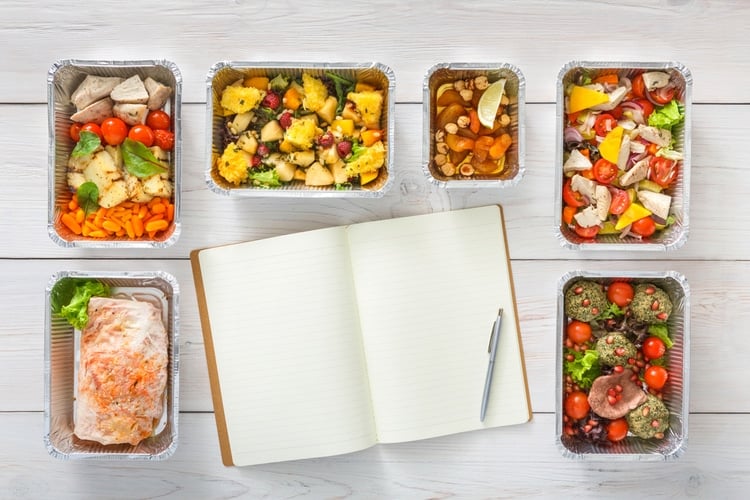Preparing healthy meals for your loved ones has never been easier!

While it’s true that eating delicious food doesn’t require much effort, food preparation often requires a little more thought. What is the good news? The more you do it, the better it gets. Meal preparation may seem like a chore for those just starting out, but these weekly meal prep tips below can greatly simplify the approach.
Keep your meal plan healthy, easy and stimulating
Often times, food planning fails due to boredom, busy schedules, or a mix of the two. This, in turn, tends to cause people to fall off the “healthy eating wagon.” Instead, you find yourself eating something quick and (often) unhealthy instead of a nutrient-dense snack or meal. This is likely one of the root reasons for taking the time to plan and organize a week’s worth of nutritious recipes. In any case, can you set a value for a few hours if it improves your fitness?
What is a meal plan?

Meal planning is how you plan a meal, all the best from start to finish. It includes deciding on a recipe, buying elements, making the meal, and even dividing it into the correct portion sizes.
Everyone can have a unique meal preparation process, so find out what works best for you. While creating your personal course, it’s up to you to decide how many meals you need to pre-cook. Your main purpose must be to discover a class that is time efficient, enjoyable, and most importantly, allows you to provide yourself and your family with nutritious food.
13 Ideas for a Weekly Meal Plan
You can decide to use all of the following weekly meal planning tips, or you can choose and choose! Remember, there is no right or wrong way. One of the easiest ways to develop a curriculum that works for you is to learn by trial and error. Before you know it, you’ll be a meal planning expert!
1. Take your time to find delicious recipes

If you already have some recipes in mind, start with them. Once you’re ready for something new, our recipe database is a great place to search for every delicious and nutritious recipe. For those planning an entire week, we recommend starting with every meal (breakfast, lunch and dinner) with one or two recipes to start with. Choose recipes that come in serving sizes so you can make the most of the leftovers.
2. Check the refrigerator for useful elements

Before you choose a recipe or make a shopping list, check your refrigerator. If you have an item with an expiration date, like chicken, fish, or contemporary vegetables, try to discover a recipe that goes with those elements to keep them from going to waste.
3. 3. Scan Ads and Clip Coupon

Another helpful tip for saving cash is to take a look at the weekly sales ads. This is especially useful for higher-cost commodities, meat, seafood, and natural products. Then, use the gadgets on sale as ideas for choosing recipes to build your meal plan for the week.
4. Discover a neat and orderly way to set up the recipe of your choice

As you pick a few recipes for this week, you’re going to need a way to keep an eye on them! I like to avoid wasting recipes I plan to make on Pinterest. I like to avoid wasting recipes I plan to make on Pinterest. You can also print them out, or bookmark them in your browser.
5. Create a calendar for dinner each night of the week

After a while, you’ll have quite a few recipes to choose from. Once you’ve selected those that you’ll schedule for this week, write them down on the calendar. Also, include what’s left over once you’re going to eat. This keeps you organized and ensures that nothing goes to waste
6. Have a large number of storage containers of different sizes

It is very useful to have a variety of ready-made containers. This allows you to retail large batches of food where you just put it together, in addition to separating each meal to a specific person portion. Serving well ahead of time will make the approaching days easier.
7. Keep a well-stocked pantry

Most recipes call for similar elements, known as pantry staples. Supplement on spices, quinoa, oats, flour, etc. so that you don’t have to buy these things every week. This may also prove useful when you have a meal to prep mid-week.
8. Choose a sourcing and meal prep day

Taking a day out of the week to buy and prepare meals is the easiest way to avoid wasting time. Most people choose Sunday, but you can choose the day that suits you best. Even for those who don’t prepare dinner directly, you must choose a certain day as your basic meal prep day.
Take a look. Meal Prep Information for Busy Ladies
9. Develop a purchase list

Now that you recognize which recipes to use, and which elements you continue to have to get, create a shopping list! In addition to everything you have to cook, remember to buy elements for healthy snacks. In addition to everything you have to cook, remember to buy the elements appropriately for a healthy snack.
related. 10 Secret Grocery Shopping Ideas You Must Know
10. Prepare and assign as many elements as possible

When you get back from the grocery store, prepare as many elements as you can. This includes issues such as washing and chopping produce, separating snacks like nuts and seeds into bags, making condiments, pickling proteins, and more.
11. The essential parts of cooking dinner in large batches

Another tip that might avoid an unimaginable amount of time (and stress) is the problem of preparing large batches of dinners like hen, beef, and rice. You should use them in many different kinds of recipes! It will be best if you choose recipes that use similar foods on a weekly basis.
12. Keep it in mind. The refrigerator is your best friend

Depending on how busy your schedule is, you may not know when you’ll have free time to prepare meals. If you have time now, put together your meals now and freeze them in specific parts for a rainy day.
Take a look. How to Pack Your Freezer Meals Like a Pro
13. Don’t ignore the problem of leftovers

We’ve talked about this already, but we need to tackle it again for our newbie meal planners! One of the biggest mistakes you can make is not knowing what to do. One of the biggest mistakes you can make is not using leftovers. This can save a lot of money and time for those who suffer from diarrhea after one bite, or even twice.
study. Here’s the best way to reheat your leftovers
Which of the following weekly meal planning tips do you find most helpful? Do you have any special meal prep tips that you just use? Let us know in the comments section below!
Also, remember to subscribe to our e-journal for the latest health advice and recipes delivered straight to your inbox.















Leave a Reply